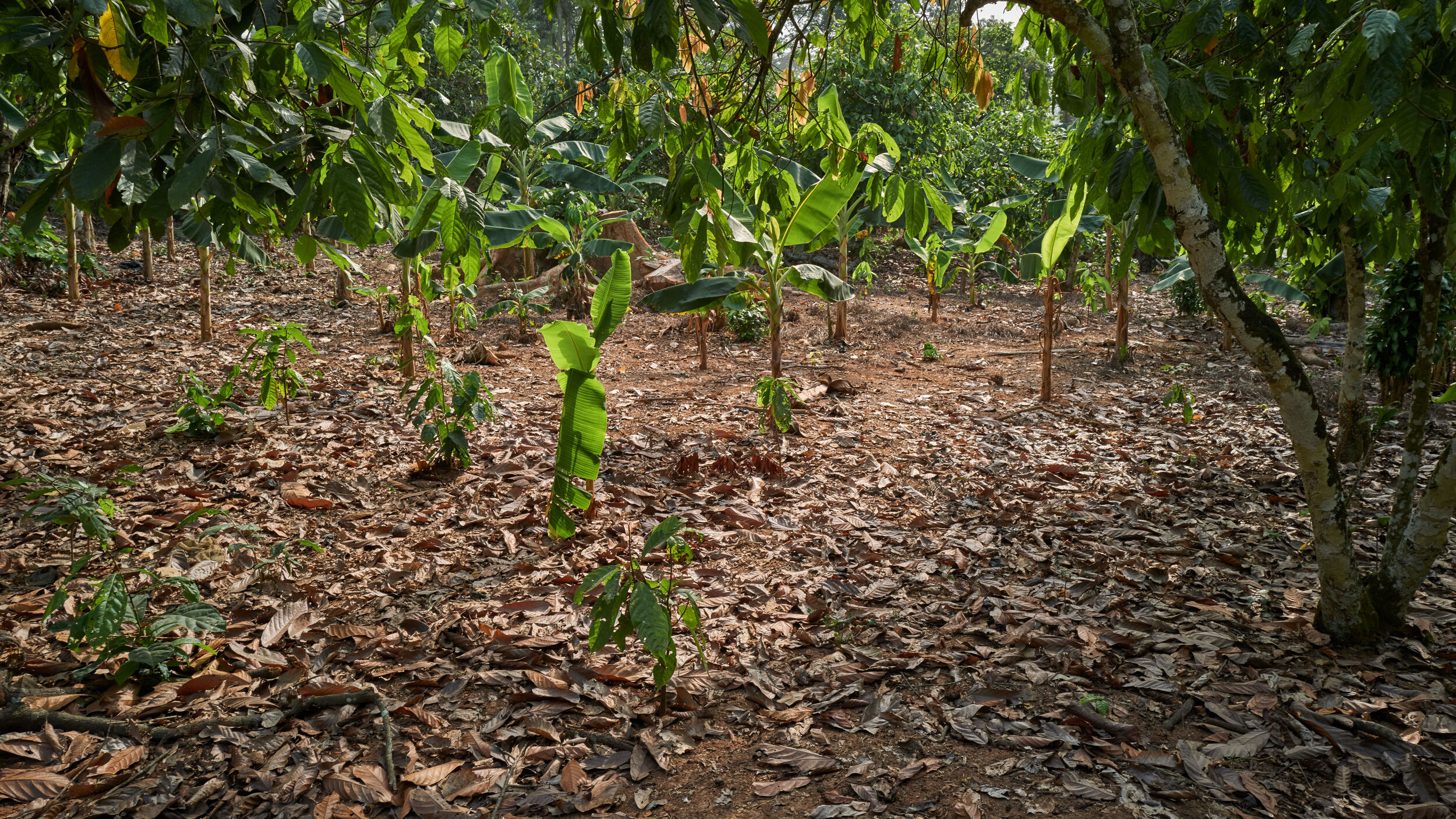Protecting natural resources and increasing farmers' incomes
What the project was about
The project had a combined focus on stopping deforestation and providing cocoa farmers with an alternative income in rural Côte d’Ivoire. The objectives were (1) to sensitise and train producers and local communities on climate change, (2) to promote and create agroforestry among producers, (3) to contribute to forest restoration, (4) to support local communities in the sustainable management of natural resources through the development of Local Land Use Sustainable Plans (LLUSP) and (5) to contribute to the diversification of producers' sources of income.
The project combined the following approaches:
Payment for Environmental Services (PES) scheme: PES are voluntary contracts concluded with the farmers or the communities, consisting of payments, in cash and/or in-kind, subject to compliance with a plan for land use and/or change of agricultural practices.
Reduction of the carbon footprint within the supply chain (Carbon insetting benefits) - in this project a carbon monitoring, quantification and insetting approach was tested. Through the project, a scalable approach to carbon asset generation was set up and will be further used across Barry Callebaut’s agroforestry and forest restoration activities.
What was done
The objective was to improve ecosystems by reducing carbon emissions from deforestation, sequestering carbon through on- and off-farm restoration and preserving biodiversity and water. The PES scheme provided farmers with additional resources to manage their agroforestry systems and to protect standing forests.
The following activities were conducted:
- Awareness raising and engagement of the community members about climate change, deforestation, forests, agroforestry, land codes and PES
- Establishing the organisational framework for the local PES project
- Supporting the implementation of Local Land Use Sustainable Plans (LLUSP), with the objective to create cocoa-based agroforestry, reforestation and conservation of residual natural forest;
- Monitoring, evaluation, learning and communication activities for measuring impact and scaling up, including carbon impact monitoring and measurement.
What the project achieved
- A critical mass of at least 1000 local actors in the project area was sensitized to climate change
- 1,200 ha of cocoa agroforestry systems were established
- 15 ha of native forest were conserved through collective and individual PES contracts
- 90 ha of land were reforested
- Two Local Land Use Sustainable Plans (LLUSPs) were implemented in a participatory manner
- Establishment of a PES scheme
What didn’t work or had unintended consequences
The main challenges were related to logistics, changing weather patterns and what is called enablers (e.g. land tenure security). While the first two challenges caused delays in the delivery of results, land tenure activity could not be delivered within the project time frame and budget. Overall, land tenure insecurity remains one of the main inhibitors for farmers and their willingness to set up agroforestry systems. Finding a solution to recognise farmers’ rights and setting up a formal agreement with legal owners of the land on which they farm is currently not scalable due to the high cost and lengthy process, which can take up to 18-24 months.
Further, a PES scheme was successfully implemented but did not deliver on its initial hypothesis, as it did not significantly increase farmers’ income. The volume of payment resulting from PES to individual farmers was low and did not cover costs associated with agroforestry management. Thus, the objective to diversify farmers’ income was only partly achieved and results on additional income generation from crop diversification will only be possible to assess in the future. For further projects, Barry Callebaut will pay higher PES amounts.

Interview with Barry Callebaut about the project
Mr. Silber, in what ways were the project’s approaches new and innovative?
Payments for Ecosystem Services have tremendous potential to better include and compensate farmers for activities that have benefits both for local ecosystems and the global climate. This project was to our knowledge the very first one testing PES approaches at a significant scale in cocoa-growing communities in West Africa. By including different activities (agroforestry, restoration and conservation), the project shed light on the effectiveness of PES in different cases. Particularly when combined with carbon finance such as insetting approaches, we believe that PES will play an important role in transforming the cocoa sector to a more sustainable future.
What has Barry Callebaut learned through the project?
We recognized the importance of involving farmer cooperatives (or similar institutions), as they are the main reference points for cocoa farmers and can help increase farmer interest and acceptance. In addition, involving local government representatives such as forestry and natural resources officials proved beneficial, particularly in areas where land ownership disputes arose.
Additionally, farmers often have limited human and time resources to invest in their cocoa plots (e.g. farming inputs, pruning etc.), including the establishment of agroforestry systems. Going forward, we aim to increase our technical support on e.g. planting and pruning. Meanwhile, a balance needs to be found to ensure sufficient engagement of participating farmers. They need to also own the activities and invest own time and effort.
What do you recommend to other stakeholders implementing similar projects?
When designing and implementing a similar project, we would recommend to 1) involve farmers in agroforestry design - especially tree species preferences can vary from region to region, 2) consider difficult logistics associated with land use and remediation activities, and 3) keep exploring most efficient PES schemes. This could be different amounts of cash payments, but also alternative rewards, such as in-kind benefits like farming inputs, tools, and basic community infrastructure.
Furthermore, to increase the engagement of actors in the cocoa sector in alignment with the science-based targets initiative (SBTi), we recommend channelling joint sectoral investments into interventions which generate ecosystem services. Novel scope 3 impact accounting methodologies, integrated into various standards, make it possible to account for and report on the impact of ecosystem services for multiple actors.
What are the next steps?
At Barry Callebaut, we have already started to strongly scale-up a modified version of the PES approach for agroforestry across Ivory Coast and Ghana, based on the learning of this project. Regarding PES for restoration and conservation, we need to further explore pathways for scale-up.
How is it ensured that the project has not only short-term, but long-term effects?
The following measures will be considered to strengthen the project’s sustainability after its completion:
- Evaluating potential for market access: Having off-take markets for non-cocoa products is essential for farmers to engage in agroforestry. Barry Callebaut will explore options for establishing market linkages and cross-sectoral partnerships.
- Expanding the farmer coverage: Barry Callebaut has an agroforestry commitment and a program to reach this commitment. Our implementation strategy is to reach high farmer coverage within a geographical location to increase intervention efficiency.
- Leaner PES infrastructure: Barry Callebaut will explore the option of re-designing the PES infrastructure. We will test using the cocoa mobile money (used to pay out sustainability premium) and have a process in place for farmers with no mobile money accounts.
Organisations involved


